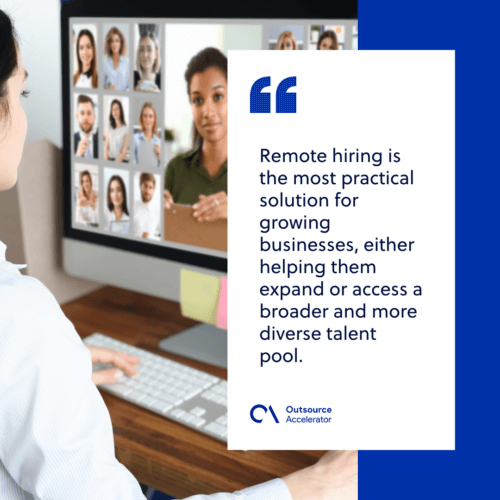Remote work is no longer a matter of time. It is a matter of fact.

It is now that we can appreciate the aftermath of the first waves of the global pandemic. Trends took a sharp turn, and others intensified exponentially with the arrival of sanitary restrictions and their social consequences.
Remote Work is one of the most prominent examples; we can easily depict the interest in remote work by using Google Trends. Right here, we can see the term “Remote Work” in the entire world over the last 18 years.
The search value reached its peak in 2020 and has maintained its popularity by at least double compared to 2017, even triple compared to the last decade.
The pandemic’s impact on remote work
This is no surprise given the vast number of companies that were hit because of their business model. According to Fortune (September 2020), about 100,000 establishments that temporarily shut down due to the pandemic went out of business.
Granted, most of these businesses would not be able to convert to remote or even a hybrid model even if they wanted since their service required either customers or employees to be physically present within the facilities.
Still, if we think about the uncertainty their employees must have gone through, we have a better idea why searches for remote work rose this much.
The main reason many companies were affected was the sanitary restrictions, limiting customers to physically entering a store and making a purchase (Even though consumers are now spending more through online options than at the height of the pandemic, according to Forbes).
Still, the bigger picture for competitiveness includes many other factors that are linked directly or indirectly to each other. These factors include:
- Cost strategy
- Budget management (money)
- Corporate culture (people)
- Processes, and
- Systems, among others
And it all comes down to strategic adaptability: A global pandemic was always a possibility, maybe just as much as any other political or economic threat. Being able to evolve as a company will determine not only survival but also dominance.

Remote work is not a temporary solution
In most scenarios, remote work is not only a contingency option or a temporary solution. It has now become the norm for many industries where both employers and employees are experiencing benefits.
According to Workplace (2021), 40% of people in the IT sector expect to work remotely full-time post-pandemic, as one of the leading sectors that employ remote workers. This partly has to do with a bigger talent pool and compatibility with the job activities and requirements.
At the same time, more diversity and inclusion can be expected by breaking down barriers and allowing organizations to become much more objective when hiring regardless of gender or ethnicity.
It is no secret that diversity plays a key role since it also positively impacts productivity. In addition, 98% of workers (Buffer, 2020) “say they’d like to work remotely at least some of the time,” which points to better employee engagement and connection to their job.
Happier people will lead to a more committed workforce, and it is they who will represent their company to the rest of the world.
Without a doubt, the ability to employ remote teams has been relevant in the past and present and will continue to grow as technology and culture evolves and encourage companies to pursue complete digital transformation.
According to Forbes, we are talking about a predicted 70% of the workforce will be working remotely by 2025. Data now available to us will continue to provide insight regarding remote work effectiveness. It goes without saying that it is possible to work remotely without losing productivity, even increasing it in most cases.
Globalization and technology have fueled each other, improving connectivity and accessibility for both businesses and consumers. The market has found numerous ways to fulfill its purpose.
Since Human Resource Management is essentially a market itself, it has also found a way around most challenges such as distance, academic accreditation, and cultural and language barriers. The increased interest in remote work directly responded to social restrictions during the pandemic.
Still, companies have noticed its benefits, and the employment of remote teams has evolved from a trend to a business strategy that solves many problems.
Outsourcing has become a widespread practice for large companies since its sole purpose is to help them get the job done. It was a practical option considering what technology allowed businesses to do.
Indeed, hiring third parties to take care of laborious operations for a lower investment sounds attractive, but thanks to technological advances, a different option has appeared, which is remote staffing.
Remote hiring is the most practical solution for growing businesses, either helping them expand or access a broader and more diverse talent pool. One considerable advantage is being able to handpick your team and have full control over its activities since they’re part of the company — and they are an extension of your team.
Because of the aforementioned, you don’t have to relinquish control of your process, team, or policies to another company as you manage your remote team. It also guarantees ownership of products and services and the flexibility to make changes without delay.
Most of the cost-saving is also there as it eliminates overhead costs such as office spaces, equipment, and even legal expenses when hiring a nearshore/offshore staffing service.
Don’t mention the added bonus of generating huge savings on the payroll as you get excellent talent globally.

Remote staffing with Remote Team Solutions
Remote staffing is among the best options when looking to grow your business and get the best talent while saving costs.
When bigger companies with the purchasing power to choose physically growing into other countries select remote staffing, it makes you think it’s a solution for all-sized companies that simply lack drawbacks.
It also eliminates the risks of hiring freelancers while keeping the benefits and staying within a reasonable cost range.
Additionally, there are now companies taking over all the administrative burden of the whole remote employment process. With an all-inclusive nearshore/offshore staffing service such as the one Remote Team Solutions offers, they take care of the whole recruitment and onboarding part as well as the local employment paperwork.
They also offer real-time support in different areas to guarantee all remote staff is up and running when required. This service captures all the benefits of remote staffing and the perks of outsourcing while eliminating the risks and drawbacks those options could cause.
At the end of the day, the right digital solution will make a difference, and the choice will not be about going remote or not, but rather which virtual platform meets the company’s needs the most.
Is your company among the leaders who already have a remote team?
This article is submitted by Mauricio Cipres, Business Development Manager at Remote Team Solutions. Remote Team Solutions is a BPO provider that focuses on HR and administrative services.







 Independent
Independent




